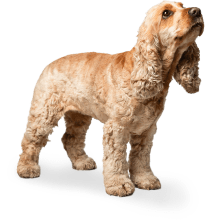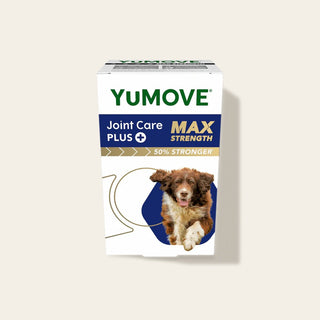

Ask the Vet: All about senior dogs
Seeking answers to your senior dog questions? Never fear, Dr Jayne Laycock BVetMed MRCVS is here to help.
“My dog is already on YuMOVE. Is there anything else I can do to help their stiff joints?”
- Keep your dog at an ideal weight for their individual size and breed
The heavier your dog, the more strain they’re putting on their joints. Your vet will be able to weigh your dog and assess their body shape to ensure they’re a healthy weight. They can also advise and offer support if they feel it would be helpful for your dog to lose a few pounds.
- Moderate their exercise levels
Too little or too much exercise can exacerbate joint stiffness. That’s why it’s important to take your dog on regular and consistent walks throughout the week in line with their ability. Don’t just opt for longer and more intense walks at the weekend. This sudden increase can exacerbate joint stiffness. Shorter, more frequent walks are usually more appropriate. If your pup does seem stiffer after a walk, then you know it’s probably been a bit too much for them, and you may need to reduce the length next time.
- Make some home adaptations
Environmental changes to your home can also be helpful. For example, putting non-slip rugs on slippery floors or supplying ramps if your senior dog regularly goes in and out of cars or up and down steps. Find out more about adapting your home for a senior dog.
- Regularly get them seen by your vet
Your vet can assess your dog’s joints and can advise whether further interventions may be necessary to help support your senior dog when it comes to stiffness.

“What are the signs of joint stiffness in senior dogs?”
As you well know, your canine companion can’t just tell you when they’re experiencing joint stiffness. The worst part? Dogs are very obedient and loyal. If you ask them to walk with you every day, or ask them to bound up the stairs and jump on your bed, they will likely oblige, even if they’re feeling particularly stiff – simply because they love spending time with you - however, are stairs bad for dogs? This is why you need to be in the know when it comes to the signs of stiffness:
- A change in behaviour – like being calmer or quieter than usual
- A lack of enthusiasm when it comes to walkies, or slowly lagging behind
- Difficulty standing up after resting
- Reluctance to go up and down stairs, or jumping in and out of cars
- Lameness
- Excessive licking at sore joints
These are just some of the warning signs of joint stiffness in dogs. We always recommend taking your dog to see your vet if you’ve got any concerns or worries.
“My dog has slowed down recently. Is this usual for a senior dog and when should I do something about it?”
Most people expect their senior dog to slow down, however, slowing down isn’t always due to ‘old age’ and it is wise not to always assume this is the case. If your dog starts to slow down, it could be a warning sign that there’s something else going on.
For this reason, we always recommend regular check-ups for senior pets. Vets can perform full examinations including blood tests and can monitor your dog’s general health. This way, if your elderly pup needs any additional support, they can get it earlier rather than later.
“My older dog has developed bad skin. Is this normal and what can I do to help them?”
Your dog’s body will age, just like yours will. But unlike wrinkles, you’ll probably notice a thinner coat, grey hairs – particularly around the muzzle – and longer and more brittle nails. The outer layer of skin can also become thickened (also known as hyperkeratosis). This is often noticeable on an older dog’s pads and nasal area. If these areas appear very dry and cracked, then it may be necessary to apply softeners/emollient ointments to keep them moisturised. Your vet can advise which is the most appropriate for your dog.
A change in the production of sebum – a waxy oily substance in your dog’s skin – can also cause your dog’s coat and skin to be dry and lacklustre. Products or supplements that are packed with fatty acids and nutrients can help support healthy skin. For instance, many of the products in our YuMOVE Skin and Coat Care range that are enriched with Omega-3 and Omega-6 oils, as well as a whole heap of other nutrients.
Do you have a senior dog who could use a bit of extra support? If so, why not try YuMOVE Joint Care PLUS Max Strength? It’s our higher-strength formula for older and stiffer dogs.





